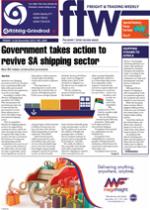Attractive new shipping
provisions in SA’s new Taxation
Laws Amendment Bill could
help realise government’s
dream of more SA-registered or
even SA-owned ships.
According to Andrew Pike,
director of shipping legal
specialists Van Velden
Pike Incorporated, the
provisions go some way
to showing that the
government is serious
about taking steps to
revive SA’s rather sleepy
international shipping
sector.
“This is recognition
that the SA shipping industry
needs to be supported by
creating incentives which not
only encourage SA ship owners
to register their ships in this
country, but also to incentivise
the business of owning and
operating ships and the
consideration of a career at sea.”
Contrary to the position in
the 1980s, there are presently
no cargo or passenger vessels
of any significance on the SA
ship register, which comprises
mostly small-scale fishing
vessels and research or pleasure
craft.
“The importance of
attracting more vessels to the
register lies in the fact that, at
present, all freight generated
by the ocean carriage of goods
and passengers (which amounts
to billions of rand each year)
leaves SA due to the relevant
ships being foreign-owned and
registered,” Pike added.
Aside from the income
which is generated by ports
and related cargo and vessel
services, this potentially huge
source of revenue stemming
from freight remains largely
untapped, and the SA economy
receives no direct benefit.
Similarly, because all of these
large vessels are flagged in
foreign states, there is also
obviously no obligation on
the ship owners to employ SA
citizens as crew.
“The key underlying
purposes behind increasing
the number of
large and internationally going
cargo and passenger vessels on
the SA register are to prevent
the outflows of freight and
passenger fares, to bolster
the SA maritime industry in
general, and to create jobs for
local seafarers,” said Pike.
The reality, he added, is
that, presently, many foreign
states offer comparatively
attractive shipping tax regimes,
where associated taxes are
either exempted altogether
or significantly reduced so
as to discourage ship owners
from migrating to other
registers. Conversely, the
current tax regime subjects all
SA companies to an income
tax rate of 28% – and no real
incentives exist
to make our
shipping
sector truly
competitive.
Pike
pointed out to FTW
what he considers right
about the bill.
The new bill proposes
introducing the following
provisions, which apply
to SA ships involved in
international shipping:
* Exemptions from normal
tax, capital gains tax and
dividends tax;
* Exemptions from
withholding tax on interest
payable to foreign financial
institutions which finance the
construction and improvement
of SA ships; and
* Exemptions from normal
tax in respect of all officers
and crew employed aboard SA
ships involved in international
shipping, including SA citizens.
But he also noted what he
considered wrong with the bill.
“While these amendments
introduced by the proposed
legislation are mostly to be
welcomed in keeping with the
international trend mentioned
above, the glaring exclusion of
cabotage or coastal shipping
from the new provisions is a
concern,” said Pike.
“Frankly, it does not seem
to make sense for cabotage
activities to be excluded.
This is especially because
there are no ships on an SA
register which is actively
trying to attract new tonnage.
Realistically speaking
(provided the incentives of
doing so are sufficient) most
ships plying a coastal trade in
SA would likely get the ball
rolling by being among the
first to migrate to the register.”
Pike also stressed that the
SA Revenue Service (Sars) had
nothing to lose by taking the
tax exemptions for shipping
even further.
“Given that the Sars
presently earns no revenue
from shipping, it would not
be forfeiting anything by
extending the tax exemptions
to all core shipping activities,”
he said.
“On the other hand, these
tax incentives could attract
more ships to the register and
boost industries such as the
ship repair and ship building
industry – from which Sars
does in fact earn revenue.”
There is another important
consideration. This is that
ships which are mainly used
for the coastal trade in SA
do from time to time make
international voyages to
neighbouring countries, such
as Mozambique. “If just a
single international voyage
were to be made in a tax year
that ship would qualify for the
relevant exemptions in the bill
as drafted,” said Pike. “There
would only be the additional
administrative burden of
separating income derived
from international trade
from that derived by a ship in
coastal trade when that ship
is involved in both types of
trading.”
The proposed Act will come
into operation on January 1
next year, and will be effective
for years of assessment
beginning on or after that
date.
Government takes action to revive SA shipping sector
13 Dec 2013 - by Alan Peat
0 Comments
FTW - 13 Dec 13

13 Dec 2013
13 Dec 2013
13 Dec 2013
13 Dec 2013
13 Dec 2013
13 Dec 2013
13 Dec 2013
13 Dec 2013
13 Dec 2013
13 Dec 2013
13 Dec 2013
13 Dec 2013
Border Beat
Featured Jobs
New
New
New
